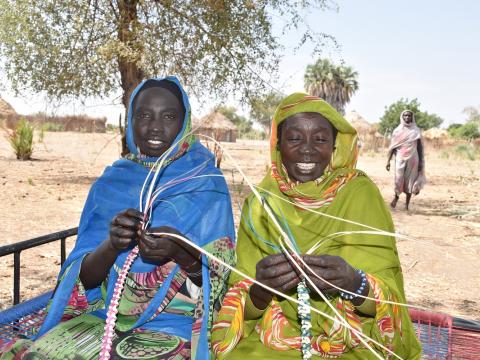A centre southeast of Sudan has become a symbol of women empowerment

Funded by Irish Aid, World Vision in partnership with CORD, a national NGO, also conducted a three-months training for 150 women, most of them internally displaced due to inter-communal conflict, left widowed and thus sole breadwinners.
We meet 49-year-old Alawia Abu Sala, her positive energy is hard to miss, but she wasn’t always this way. Married off when she was barely 15 years old, Alawia was forced to grow up real fast. The same fate befell her daughter Nawal (now 24-year-old and a mother of three children) who was married at only 14-years-old.
But now being more informed about women and children’s rights, the two are determined to see to it that the same never happens to any other female in the family. They are therefore putting all their hopes in Rimaz, Alawia’s granddaughter (Nawal’s daughter) a seventh grader in a nearby school.
11-year-old Rimaz poses with her grandma who together with her mother believe she will have more choices in life because of her education.
“I was eager to go to school when I was my daughter’s age but at that time no one encouraged me,” Nawal says.
Financial independence = expanded choices
11-year-old Rimaz dreams of becoming an engineer when she graduates from the university. "I would like to build more schools in Kadalu, as well as a big hospital," she says. Alawia’s and Nawal both believe that unlike them, Rimaz will have the ability to make her own choices such as deciding when to marry and possibly who to marry.
After undergoing a three-month vocational training on artisanal handicraft, today both mother and daughter specialise in making straw hats and ladies’ handbags, using locally available materials such as palm leaves. Luckily for them Gezira Kadalu village is famous for local type palm tree.
Nawal works six days (except for Fridays when she goes for prayers) a week and makes at least three handbags a day, while her mother makes straw hats. It is a labour of love for both mother and daughter who now are able earn a decent income out of it.
“In January, their income from the sales came to 6,300 Sudanese Pounds (US$139). This has meant that they can now take care of their family needs.
“I am very happy because my daughter Rimaz is doing well in school,” Nawal says. For now she doesn’t have to worry about dropping out of school because I am able to pay her school fees and meet other requirements. The average years of schooling in Sudan is seven years.
Most of their customers are from nearby villages who come to the centre regularly to buy their items. “Sometimes we take the items to the neighbouring local markets.
Women boast of expanded capabilities
For 39-year-old Sitabuha who specialises in making perfume, the 6,700 Sudanese Pounds (US$147) she earned in sales between December and February, enabled her to pay school fees for her two children now in elementary school, and meet other family expenses.
The women make the perfume using sandalwood mixed with aromatic plants that is found in the local talah tree.
36-year-old Arafa Mohammed, a mother of seven dutifully works on her sewing machine, stitching a school uniform. “I had no idea about cloth-making when I first joined the project,” she admits.
Arafa takes care of her family thanks to the tailoring skills she gained from the centre. She runs a cloths business.
“The training not only helped me gain practical skills but also gave me financial independence. Besides, I no longer have to worry about buying uniforms for my children. I make them myself,” the seamstress says.
For someone who at first wasn’t quite confident in her sewing skills, over time she seems to have mastered the art. Besides uniforms she also makes children and women’s outfits of which she sells at the local market, as well as in neighbouring villages.
Women centre a symbol of economic empowerment
From the days when she spent the entire day making just a single uniform, Arafa now makes three to four a day,” she says of the progress, with such admiration as if to point to the fact that she has indeed come a long way.
Today the centres have become a symbol of women empowerment and economic transformation. At least 4 out of 10 people in Sudan live below the poverty line that is, they earn under $US1.25 a day, but with this new found entrepreneurial skills, these women are slowly changing these statistics.
According to World Vision’s Hayat al Toum, officer in-charge, the project has paved the way for women, particularly the most vulnerable to financial independence. “Over time they have also become generally aware of their rights,” she notes. The women have also grown fond of each other, Hayat adds.
The centre now is fully run by the women after World Vision handed it over in December of 2018. But now these promising entrepreneurs will have to learn to fly on their own. Nawal and Alwia currently save part of their earnings to sustain their business.
They are into perfume and incense making and through this they are able to earn decent income for their families.
Story by Gamal Ghallab, World Vision Sudan’s communications officer
Lucy Murunga contributed to this article


